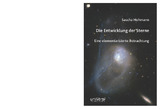Citation link:
http://dx.doi.org/10.25819/ubsi/486Files in This Item:
| File | Description | Size | Format | |
|---|---|---|---|---|
| Dissertation_Sascha_Hohmann.pdf | 177.57 MB | Adobe PDF |  View/Open |
| Dokument Type: | Doctoral Thesis | metadata.dc.title: | Die Entwicklung der Sterne : eine elementarisierte Betrachtung | Authors: | Hohmann, Sascha | Institute: | Department Physik | Free keywords: | Astrophysik, Didaktik, Mathematische Modelle, Schule, Astrophysics, Didactics | Dewey Decimal Classification: | 530 Physik | GHBS-Clases: | VHH VDA VAN |
Issue Date: | 2019 | Publish Date: | 2019 | Source: | Siegen : universi - Universitätsverlag Siegen, 2019. - ISBN 978-3-96182-050-4 | Abstract: | In der vorliegenden Arbeit werden Wege untersucht, um die stellare Physik zu elementarisieren und in Lehrkonzepte zu überführen. Damit sollen angehenden oder tätigen Lehrenden der Physik Mittel an die Hand gegeben werden, die ein angemessenes Theorieverständnis ermöglichen. In erster Linie wird damit bezweckt, eine wesentliche Forschungsmethode der Astrophysik - nämlich Himmelskörper mathematisch so zu modellieren, dass an ihrer Oberfläche beobachtbare Phänomene vorhergesagt werden - im Lehr- und Unterrichtsbetrieb zu präsentieren. Bekanntlich werden viele astrophysikalische Phänomene in der Lehrliteratur nur phänomenologisch abgehandelt, wodurch das Desiderat entsteht, dass die eigentliche Untersuchungsmethodologie nur ungenügend vermittelt wird. In der Promotionsschrift wird berücksichtigt, dass Astrophysik nur einen kleinen Teil eines Physikstudiums für das Lehramt ausmacht, der Stoff daher komprimiert und ohne tiefere Vorkenntnisse zu behandeln ist. Weiterhin wird anhand der Analyse von Aufgaben zweier Schulbuchreihen gezeigt, dass quantitatives Arbeiten insbesondere in der Sekundarstufe II einen großen Teil des Physikunterrichts ausmacht und sich daher mathematisches Modellieren für Übungen anbietet. Von jeher unterliegt die Astrophysik einem besonders kritischen, erkenntnistheoretischen Blick, da sie naturgegeben weitgehend auf die experimentelle Untersuchung ihrer Forschungsgegenstände verzichten muss und nur anhand passiver Beobachtungen zu Erkenntnissen gelangen kann. Eine sinnvolle Beschäftigung mit modernen Forschungsresultaten der Astrophysik ist daher ohne eine besondere Einbindung in einen erkenntnistheoretischen Rahmen kaum vorstellbar. Daher werden in der vorliegenden Schrift erkenntnistheoretische Grundlagen vorgestellt, die einen kritischen Blick auf die Entwicklung einer astrophysikalischen Theorie ermöglichen. Es werden Varianten aufgezeigt, die Sterne sowohl als quasi-statische Objekte zu betrachten als auch ihre Entwicklung näher zu beleuchten. Speziell auf die Bedingungen zur Entwicklung von Leben auf einem Planeten und die dabei bestehenden Zusammenhänge zum Zentralgestirn wird eingegangen, da die Frage nach Leben auf anderen Planeten ein für Lernende interessantes Thema ist. Die präsentierten Modelle benötigen dabei nur Mathematik und Physik der Grundvorlesungen, teilweise genügt Abiturniveau. This thesis is about ways of simplifying stellar physics and of transferring them into teaching concepts. The aim is to provide future or active teachers of physics with the means to gain an appropriate understanding of theory. The main goal is to present an essential research method of astrophysics - to model celestial bodies mathematically in such a way that observable phenomena are predicted on their surface - in teaching. Currently, many astrophysical phenomena are only dealt with phenomenologically in teaching literature, which results in the desideratum that the actual research methodology is only insufficiently conveyed. This doctoral thesis takes into consideration astrophysics being only a minor part of a physics course in the teaching-study program, therefore the material is condensed and can be accessed without deeper previous knowledge. Furthermore, the analysis of the tasks of two textbook series shows that quantitative work, especially in secondary level II, constitutes in a large part of physics teaching and that mathematical modelling therefore is suitable for exercises. Astrophysics has always been subject to a particularly critical, epistemological view, since it naturally has to largely dispense with the experimental investigation of its research objects and can only lead to findings based on passive observations. A meaningful occupation with modern research results of astrophysics is therefore hardly imaginable without a special integration into an epistemological framework. Thus, the presented paper shows epistemological fundamentals that allow a critical view on the development of an astrophysical theory. Variants are shown to view the stars both as quasi-static objects and to shed light their evolution. Particularly the conditions for the development of life on a planet and the existing connections to the central star are discussed, since the question of life on other planets is an interesting topic for learners. The presented models are based on basic mathematics and physics lectures, partly even high school level is sufficient. |
DOI: | http://dx.doi.org/10.25819/ubsi/486 | URN: | urn:nbn:de:hbz:467-15160 | URI: | https://dspace.ub.uni-siegen.de/handle/ubsi/1516 | License: | https://dspace.ub.uni-siegen.de/static/license.txt |
| Appears in Collections: | Hochschulschriften Universi |
This item is protected by original copyright |
Page view(s)
1,388
checked on Dec 1, 2024
Download(s)
512
checked on Dec 1, 2024
Google ScholarTM
Check
Altmetric
Items in DSpace are protected by copyright, with all rights reserved, unless otherwise indicated.

